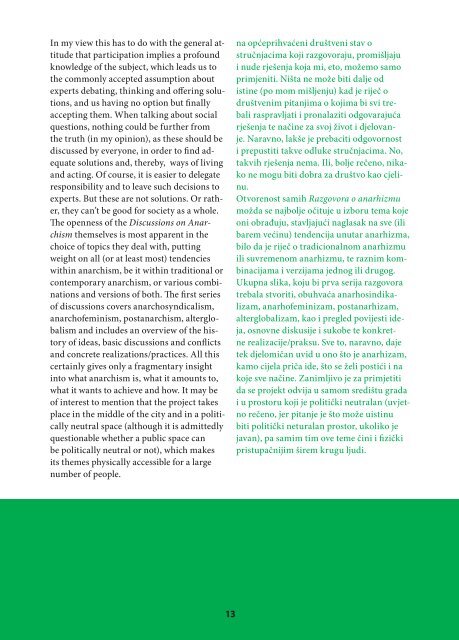Create successful ePaper yourself
Turn your PDF publications into a flip-book with our unique Google optimized e-Paper software.
In my view this has to do with the general attitude<br />
that participation implies a profound<br />
knowledge of the subject, which leads us to<br />
the commonly accepted assumption about<br />
experts debating, thinking and offering solutions,<br />
and us having no option but finally<br />
accepting them. When talking about social<br />
questions, nothing could be further from<br />
the truth (in my opinion), as these should be<br />
discussed by everyone, in order to find adequate<br />
solutions and, thereby, ways of living<br />
and acting. Of course, it is easier to delegate<br />
responsibility and to leave such decisions to<br />
experts. But these are not solutions. Or rather,<br />
they can’t be good for society as a whole.<br />
The openness of the Discussions on Anarchism<br />
themselves is most apparent in the<br />
choice of topics they deal with, putting<br />
weight on all (or at least most) tendencies<br />
within anarchism, be it within traditional or<br />
contemporary anarchism, or various combinations<br />
and versions of both. The first series<br />
of discussions covers anarchosyndicalism,<br />
anarchofeminism, postanarchism, alterglobalism<br />
and includes an overview of the history<br />
of ideas, basic discussions and conflicts<br />
and concrete realizations/practices. All this<br />
certainly gives only a fragmentary insight<br />
into what anarchism is, what it amounts to,<br />
what it wants to achieve and how. It may be<br />
of interest to mention that the project takes<br />
place in the middle of the city and in a politically<br />
neutral space (although it is admittedly<br />
questionable whether a public space can<br />
be politically neutral or not), which makes<br />
its themes physically accessible for a large<br />
number of people.<br />
13<br />
na općeprihvaćeni društveni stav o<br />
stručnjacima koji razgovoraju, promišljaju<br />
i nude rješenja koja mi, eto, možemo samo<br />
primjeniti. Ništa ne može biti dalje od<br />
istine (po mom mišljenju) kad je riječ o<br />
društvenim pitanjima o kojima bi svi trebali<br />
raspravljati i pronalaziti odgovarajuća<br />
rješenja te načine za svoj život i djelovanje.<br />
Naravno, lakše je prebaciti odgovornost<br />
i prepustiti takve odluke stručnjacima. No,<br />
takvih rješenja nema. Ili, bolje rečeno, nikako<br />
ne mogu biti dobra za društvo kao cjelinu.<br />
Otvorenost samih Razgovora o anarhizmu<br />
možda se najbolje očituje u izboru tema koje<br />
oni obrađuju, stavljajući naglasak na sve (ili<br />
barem većinu) tendencija unutar anarhizma,<br />
bilo da je riječ o tradicionalnom anarhizmu<br />
ili suvremenom anarhizmu, te raznim kombinacijama<br />
i verzijama jednog ili drugog.<br />
Ukupna slika, koju bi prva serija razgovora<br />
trebala stvoriti, obuhvaća anarhosindikalizam,<br />
anarhofeminizam, postanarhizam,<br />
alterglobalizam, kao i pregled povijesti ideja,<br />
osnovne diskusije i sukobe te konkretne<br />
realizacije/praksu. Sve to, naravno, daje<br />
tek djelomičan uvid u ono što je anarhizam,<br />
kamo cijela priča ide, što se želi postići i na<br />
koje sve načine. Zanimljivo je za primjetiti<br />
da se projekt odvija u samom središtu grada<br />
i u prostoru koji je politički neutralan (uvjetno<br />
rečeno, jer pitanje je što može uistinu<br />
biti politički neturalan prostor, ukoliko je<br />
javan), pa samim tim ove teme čini i fizički<br />
pristupačnijim širem krugu ljudi.


